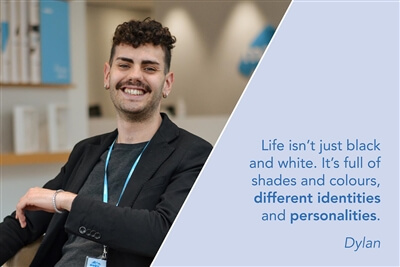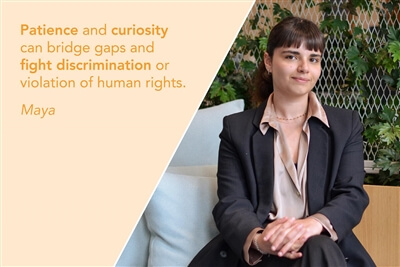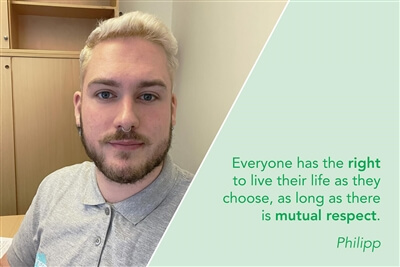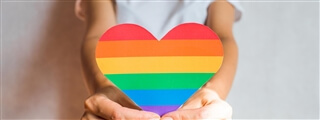Pride and gender diversity
At Markas diversity is more than just a policy. It's a core value that shapes our culture and approach to work. This Pride month, we spoke with our colleagues, Maya Carella, Organization and Digitalization Specialist, Dylan Strusi, Hospitality Specialist, and Philipp Schnopfhagen, Administrator, in order to hear their thoughts on gender diversity and the significance of celebrating Pride.
Would you like to tell us a few words about Pride and its origins?
Dylan: Pride has its roots in the struggle for LGBTQ+ rights and equality. On June 28, 1969, a police raid at the Stonewall Inn in New York City led to six days of protests, marking a pivotal moment in the fight for LGBTQ+ rights. One year later, the first Pride marches were held to commemorate the anniversary of the Stonewall uprising. Pride has since evolved into a global movement celebrating LGBTQ+ identities and in general advocating for equality and acceptance.
Maya: For me the most important thing to remember about the history of Pride is that it is created out of necessity by members of the LGBTQ+ community. While it’s now seen as a celebration, it originated as a protest against discrimination, fighting for basic human rights that were not respected then and, in some cases, are still not respected today. Understanding its story underscores the importance of Pride as more than just a fun event - it’s a continued struggle for equality. Pride isn’t just about street parades and parties. It’s an opportunity to discuss crucial topics that might be ignored throughout the year. It’s an occasion that reminds us the importance of diversity and human rights.
Philipp: June is Pride Month, what does this mean? It means celebrating acceptance, pride, and love in the queer community and in general in the world.
Would you like to tell us a few words about Pride and its origins?
Dylan: Pride has its roots in the struggle for LGBTQ+ rights and equality. On June 28, 1969, a police raid at the Stonewall Inn in New York City led to six days of protests, marking a pivotal moment in the fight for LGBTQ+ rights. One year later, the first Pride marches were held to commemorate the anniversary of the Stonewall uprising. Pride has since evolved into a global movement celebrating LGBTQ+ identities and in general advocating for equality and acceptance.
Maya: For me the most important thing to remember about the history of Pride is that it is created out of necessity by members of the LGBTQ+ community. While it’s now seen as a celebration, it originated as a protest against discrimination, fighting for basic human rights that were not respected then and, in some cases, are still not respected today. Understanding its story underscores the importance of Pride as more than just a fun event - it’s a continued struggle for equality. Pride isn’t just about street parades and parties. It’s an opportunity to discuss crucial topics that might be ignored throughout the year. It’s an occasion that reminds us the importance of diversity and human rights.
Philipp: June is Pride Month, what does this mean? It means celebrating acceptance, pride, and love in the queer community and in general in the world.

What does Pride mean to you personally?
Dylan: I grew up in a small village and I’ve always been a bit more feminine in my mannerisms. Although I had a happy childhood and my family always supported me, my school years were tough due to a closed society that didn't accept me. It wasn’t until high school, and later, through a TV program, that I began to accept myself. I realized I wasn’t ‘odd’ and that there were others like me. This realization helped me embrace who I am. So for me Pride is exactly what the word means: being proud of who you are. While it's primarily about gender identity, it's also about broader issues like disability, race, and other forms of discrimination. It is a celebration of diversity, acceptance, and body positivity. And for me Pride’s colours represent the diversity of our world. Life isn't just black and white; it's full of shades and colours; different identities and personalities. In other words Pride is about celebrating the vibrant diversity of our world.
Maya: I define myself as queer. For me, queer means having the freedom to love whoever I want without stereotypes or bias. It’s about not limiting myself to certain frameworks. And that’s the real meaning of Pride: a moment when everyone can feel free to be themselves without judgment or prejudice; a celebration of intersectionality; a moment of reflection and exchange of ideas with people who might have different perspectives, reminding us that inclusion is about embracing everyone.
Philipp: I am 25 years old, I have a pretty ordinary life; I study biology and chemistry in order to become a teacher while at the same time I work at Markas. At the age of 20 I moved in with my boyfriend and I am perfectly happy since then. So for me, Pride means finally being the person you really are without anyone judging you or telling you how you should live your life. Unfortunately nowadays, many people are simply afraid of being excluded by society, their families or friends.
Dylan: I grew up in a small village and I’ve always been a bit more feminine in my mannerisms. Although I had a happy childhood and my family always supported me, my school years were tough due to a closed society that didn't accept me. It wasn’t until high school, and later, through a TV program, that I began to accept myself. I realized I wasn’t ‘odd’ and that there were others like me. This realization helped me embrace who I am. So for me Pride is exactly what the word means: being proud of who you are. While it's primarily about gender identity, it's also about broader issues like disability, race, and other forms of discrimination. It is a celebration of diversity, acceptance, and body positivity. And for me Pride’s colours represent the diversity of our world. Life isn't just black and white; it's full of shades and colours; different identities and personalities. In other words Pride is about celebrating the vibrant diversity of our world.
Maya: I define myself as queer. For me, queer means having the freedom to love whoever I want without stereotypes or bias. It’s about not limiting myself to certain frameworks. And that’s the real meaning of Pride: a moment when everyone can feel free to be themselves without judgment or prejudice; a celebration of intersectionality; a moment of reflection and exchange of ideas with people who might have different perspectives, reminding us that inclusion is about embracing everyone.
Philipp: I am 25 years old, I have a pretty ordinary life; I study biology and chemistry in order to become a teacher while at the same time I work at Markas. At the age of 20 I moved in with my boyfriend and I am perfectly happy since then. So for me, Pride means finally being the person you really are without anyone judging you or telling you how you should live your life. Unfortunately nowadays, many people are simply afraid of being excluded by society, their families or friends.

Do you think sexual orientation remains the “last acceptable and remaining prejudice” in modern societies and organizations?
Dylan: I think in general lately we see a regression in human rights, not just for LGBTQ+ individuals. It's more crucial than ever to advocate for basic human rights and ensure progress rather than regress. I have never faced racism at work and I am glad to work in an environment where I can be true to myself. But in the past, I lost a friend after coming out. That was a significant moment of discrimination for me and I know how it feels. So let’s support the liberty of choice and stand against the fear of evolution.
Maya: While I haven't personally faced discrimination, many LGBTQ+ individuals worldwide still hide their identities to avoid judgment. Although the situation is improving, negative incidents persist, often due to ignorance and misunderstanding. Companies should foster open dialogue, address biases, and promote understanding through workshops and discussions. Unfortunately, nowadays, some organizations commercialize Pride for profit, losing sight of its true meaning. Pride should be a year-round effort, emphasizing education and awareness about diversity and human rights.
Philipp: Significant progress has been made lately in Austria with legalizing same-sex marriage, lifting the adoption ban for homosexual couple, etc. However there is still a lot of work to be done. Addressing biases is crucial. I think often aggressive behaviours around gender identity persist mainly because of ignorance or misinformation. So, I think raising awareness around this topic is crucial.
Dylan: I think in general lately we see a regression in human rights, not just for LGBTQ+ individuals. It's more crucial than ever to advocate for basic human rights and ensure progress rather than regress. I have never faced racism at work and I am glad to work in an environment where I can be true to myself. But in the past, I lost a friend after coming out. That was a significant moment of discrimination for me and I know how it feels. So let’s support the liberty of choice and stand against the fear of evolution.
Maya: While I haven't personally faced discrimination, many LGBTQ+ individuals worldwide still hide their identities to avoid judgment. Although the situation is improving, negative incidents persist, often due to ignorance and misunderstanding. Companies should foster open dialogue, address biases, and promote understanding through workshops and discussions. Unfortunately, nowadays, some organizations commercialize Pride for profit, losing sight of its true meaning. Pride should be a year-round effort, emphasizing education and awareness about diversity and human rights.
Philipp: Significant progress has been made lately in Austria with legalizing same-sex marriage, lifting the adoption ban for homosexual couple, etc. However there is still a lot of work to be done. Addressing biases is crucial. I think often aggressive behaviours around gender identity persist mainly because of ignorance or misinformation. So, I think raising awareness around this topic is crucial.

Is there anything we can all learn from Pride and its story?
Dylan: Believe in yourself, and you'll find people who accept you for who you are. Life is marvellous; every experience shapes who we are today. And to everyone who is a bit more sceptical towards Pride and LGBTQ+ community, approach the world with a child-like curiosity. Curiosity eliminates ignorance and helps us see beyond biases and stereotypes.
Maya: Have patience and curiosity! If you are faced with prejudice, be patient with people. On the other hand, get to know what scares you. Often, our judgments are based on stereotypes, and we don’t take the time to speak and listen. I think patience and curiosity can bridge gaps and foster true understanding among individuals, organizations, societies and nations.
Philipp: Everyone has the right to live their life as they choose, as long as there is mutual respect. You only live once and life is far too short and too precious not to be happy. Everyone in the world deserves love and happiness. With this in mind, Happy Pride!
Dylan: Believe in yourself, and you'll find people who accept you for who you are. Life is marvellous; every experience shapes who we are today. And to everyone who is a bit more sceptical towards Pride and LGBTQ+ community, approach the world with a child-like curiosity. Curiosity eliminates ignorance and helps us see beyond biases and stereotypes.
Maya: Have patience and curiosity! If you are faced with prejudice, be patient with people. On the other hand, get to know what scares you. Often, our judgments are based on stereotypes, and we don’t take the time to speak and listen. I think patience and curiosity can bridge gaps and foster true understanding among individuals, organizations, societies and nations.
Philipp: Everyone has the right to live their life as they choose, as long as there is mutual respect. You only live once and life is far too short and too precious not to be happy. Everyone in the world deserves love and happiness. With this in mind, Happy Pride!
ARTICLES YOU MAY LIKE







